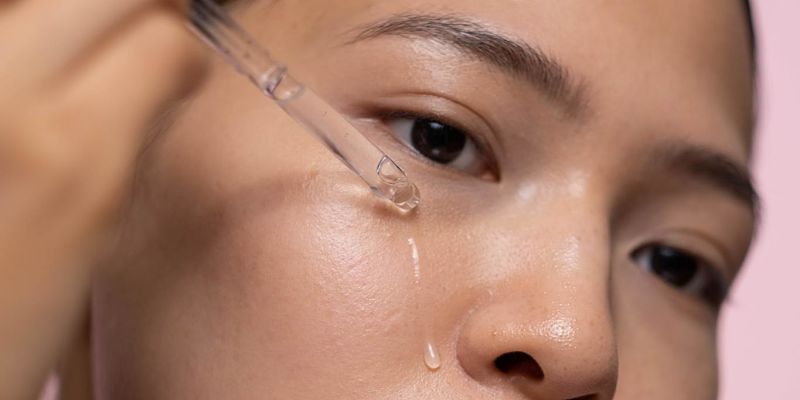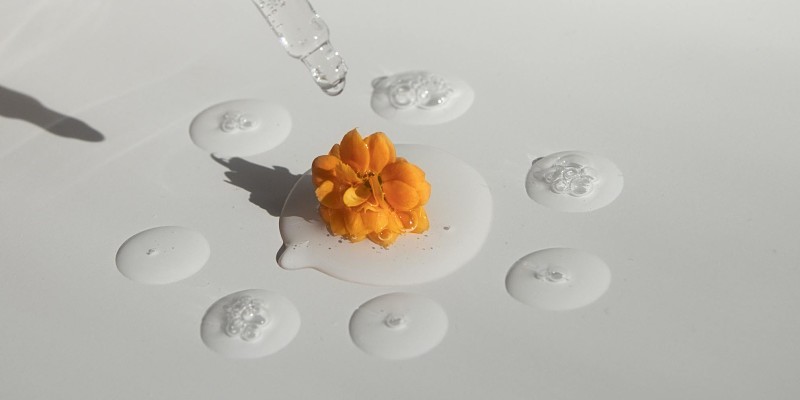Can You Mix Two Serums Together?
Can you mix two serums together? Yes! It is completely okay to mix two serums together, or even more. However, there are a couple of guidelines to abide by when mixing. Firstly, you need to mix each serum in the palm of your hand before applying to your face.
Secondly, make sure that the skin serums that you are planning to mix are of the same texture and consistency. This is in order for them to mix well without clotting, otherwise the mixture won't turn out smooth.
So can you mix serums for face with different textures? Yes, there is actually something you can do. Start with the serum which has the lightest texture. Then move on to the serum that has a heavier texture. It's also important to apply the most potent serums first and the least potent ones second.
What Exactly Is a Face Serum?
A serum is a skincare product that is based on a potent substance. They're designed to deliver high concentrations of specific active ingredients to the skin. Nowadays, there is a wide variety of different skin serums all made from different ingredients. They serve a number of various functions from daily hydration to treating acne scars.
Serums can be gel-based, have a liquid consistency and resemble the consistency of a light-textured moisturiser. Most face serums act by delivering a potent dose of topical antioxidants. These include vitamins A, C and E, as well as topical retinoids and other ingredients.
When used in combination with other treatments, serums can treat such long-term aging effects as pigmentation, and wrinkles. Moreover, a face serum is capable of hydrating your skin more effectively than creams with the richest textures. This is as a result of the molecules that serums contain being able to properly penetrate the skin. This allows the delivery of hydration on the deepest levels of the dermis. On the other hand, the creams that are rich in texture often just stay on top of your skin. This contributes to pore clogging and an accumulation of excess oils.
However, experts also noticed that while hydrating serums are able to increase or provide similar hydrating effects as a moisturiser, moisturisers are still necessary.
Can You Mix Two Serums Together Safely?
Some skincare outlets might suggest avoiding mixing your skincare products to avoid mistakes in the ordering. However, with the correct approach it's not only possible to mix two serums together, but might also help you achieve the best results. Experts suggest adopting a specific schedule which you should follow in order to get the most of your products without stripping them of their effectiveness.
The first thing you should do is clean your skin with your cleanser of choice, then follow it with a faciak mask. After this, apply targeted products that offer the most potent solution packed with a number of active ingredients that suit your skincare goals for better absorption. These products can include targeted vitamin or retinoid formula. Furthermore, apply your serums followed by a moisturizer and finish off with an SPF.
Likewise, there are other things to keep in mind when attempting to mix two serums together. Experts urge you to be mindful of what skin products go after another one in your skincare routine. If you’re using a harsh cleanser, scrub or mask, be careful with any follow up products. Some products, like retinol serums or vitamin C serums, might be too aggressive to apply on your skin right after vigorous cleansing as they might cause irritation and itching sensations.
So You Can Mix Two Serums Together, But Can You Mix More Than 2?
The reason why people suggest a maximum of two or three serums comes down to layering and penetration.
- The Skin Nerd
Which Serums Shouldn't You Mix?
There is one other thing to consider. While all serums are a potent, vitamin and antioxidant-packed solution, some serums just don’t go together well and it's important to avoid mixing those products.
It has been widely debated if retinoid-based products are mixable with serums. Nevertheless, experts say that it is possible to mix a serum containing retinyl palmitate (another form of vitamin A) with another product of your choice. Moreover, experts recommend avoiding mixing products that contain alpha-hydroxy acids or beta-hydroxy acids with products that contain vitamin A. This is due to vitamin A promoting skin’s regeneration, while AHAs and BHAs products promote exfoliation, which can be too overwhelming for your skin.
Can you mix serums containing vitamin C, with retinol serums? No, this is because both ingredients are very complex, delicate compounds and will not work stably together. Experts suggest this general rule of thumb: botanical ingredients, skin-calming ingredients and hydration mix safely, while other combinations might require some further thought.
What’s even more important is to never mix your serums with SPF. Experts point out that SPF needs to be the final thing on your skincare routine. SPF acts by creating a barrier between the skin, UV light radiation and external pollutants. Mixing the SPF with your serums will make the SPF ineffective as well, leaving your skin unprotected from UV radiation.
The Benefits of Using a Vitamin C Serum
It can be difficult for us to consume enough vitamin C as we can't produce it naturally and our body can't store it either. By using a vitamin C serum you are allowing the nutrient to penetrate directly into your skin and deliver its various health benefits. Vitamin C serums have been widely used to reverse the visible effects of aging, and to smooth and brighten the skin to give a radiant and glowing complexion.
First and foremost, vitamin C is safe to use on almost all skin types. This allows most people to use vitamin C serums as a topical treatment for prolonged periods of time without facing any potential side effects. Side effects can manifest themselves in different levels of sensitivity. However, these side effects are commonly observed only in people with hypersensitive skin, certain skin conditions or citrus allergies.
The second reason why you should be using vitamin C serums is due to their powerful hydrating and brightening properties. Vitamin C has been shown to reverse skin pigmentation, reduce dullness and give your skin a youthful glow. Moreover, studies show that magnesium, one of the main vitamin C derivatives used in skincare, acts as a hydrating agent. This decreases transepidermal water loss and allows the skin to retain moisture.
According to research, vitamin C treats a wide variety of inflammatory skin conditions, while minimising redness and rashes. Vitamin C has also been shown to reduce the appearance of under-eye circles and increase collagen production. It also prevents the loss of elasticity and helps protect the skin from sun damage and premature aging.
What Serum Should I Use?
Here are just some of our recommended serums:
This serum comes from skincare pioneers Endocare and is one of their best! It delivers the highest level of skin protection against environmental aggressors including pollution, sunlight & tobacco smoke. The serum contains high concentrations of antioxidants, including vitamin C and ferulic acid, to combat damaging free radicals. It is clinically proven to boost fibroblast activity, which helps to create more collagen, elastin and hyaluronic acid.
Osmosis have an excellent range of the best retinol serums that vary in strength. We recommend starting with a gentler serum such as the Calm Gentle Retinal Serum before moving on to one with a higher strength. Retinal can irritate the skin so it is best to start with a smaller dosage.
The Osmosis retinal serums tackle all signs of aging from fine lines and wrinkles, to sagging skin and weak barrier functions. They also boost the skin's level of nutrients, while improving moisture levels.
This serum is the best in menopause skincare for women who want to see real age-reversing results. The silky, lightweight formula makes for easy absorption and utilises groundbreaking anti-aging MEP technology. It is the first-ever skincare innovation that non-hormonally restores the estrogen in the skin before, during, and after menopause. Dramatic anti-aging improvements are visible in 4-8 weeks.
What Is the Best Serum for the Face?
While there are a lot of options to choose from, it is important to identify correctly what your skin needs.
If you’re in your 20s, experts advise opting for a serum that increases collagen production, as well as retinol serums. These promote healthy cell turnover and are instrumental in reducing the development of fine lines and wrinkles.
If you’re in your 30s it might be best to implement a vitamin C serum into your daily routine. These help brighten the skin, reduce dullness and smooth out deeper lines, wrinkles and pigmentation.
If you’re in your 40s using a hyaluronic acid serum would be a great idea. They promote a healthy moisture balance and allow the skin to retain moisture for longer, making it appear youthful and supple.
Hopefully, with our list of helpful tips and guidelines, you will be able to choose your serums, mix them and apply them correctly.
FAQ
How many serums can you use at once?
It is recommended to use 2 or 3 serums at once. Such blends allow for achieving a better effect and nourishing the skin with all the needed ingredients.
Can you use two serums at once?
Yes, mixing two serums is a common strategy for skincare. Such cocktails do not harm the skin and provide a powerful nourishing effect.
Which serums can be used together?
It is possible to combine different serums. It is easier to list what combinations are not allowed:
- AHAs or BHAs with Vitamin A. AHA/BHAs provide an exfoliating effect, while Vitamin A boosts skin regeneration. As a result, it can be too much for cells.
- Retinol + Vitamin C. Both components are quite complex and do not work stably when applied together.
- serums + SPF. This cocktail leads to SPF ineffectiveness. Serums make SPF products ineffective, so your sin remains unprotected from UV radiation.
Can I use two different serums for day and night?
Yes, it is a perfect strategy for your daily skincare routine. It is possible to use different serums. This way, cells will receive more ingredients.
Can you use more than one serum?
Yes, it is possible to create cocktails of serums. However, it is not recommended to use more than 3 serums at once.
Can you layer serums?
The right application of serums states that just a few drops of the product are required to cause a nourishing effect on cells. So, it’s enough to wrap 3-5 drops on your face to nourish cells and provide the required effect.
Can you mix serum with a moisturizer?
Usually, they are applied gradually. Serums are applied after toning and before moisturizing. Serums are left for a few minutes to let them absorb. Then, a moisturizer is applied.
How many serums should I use?
You can use either one or several serums. It all depends on your skin condition and its imperfections. Depending on what problems you cope with, the number of blended and used serums differs.
Can I use 3 serums at the same time?
Yes, it is possible to cocktail 3 different serums. Just remember what types of blends are incompatible, and the rest is OK.
Can you use collagen serum and hyaluronic acid together?
Yes, both ingredients are perfectly compatible. Thus, there are no restrictions on blending them together. Both components have a powerful effect on cells, meaning that your skin will receive twice more benefits.





